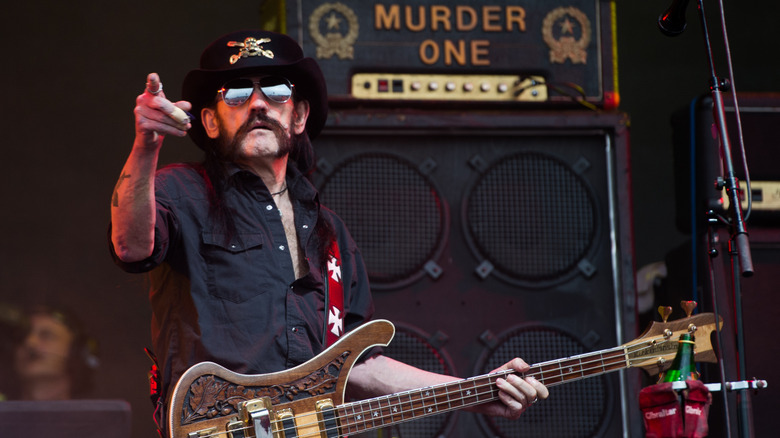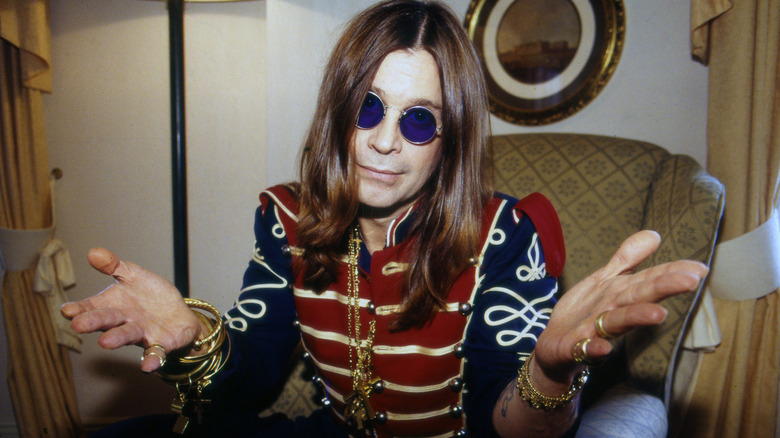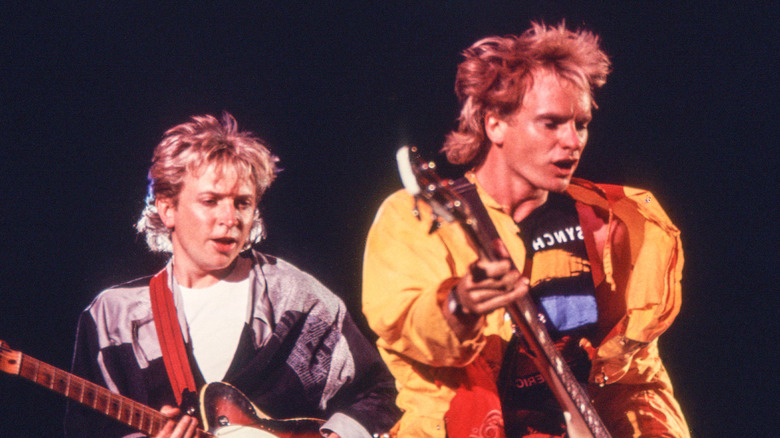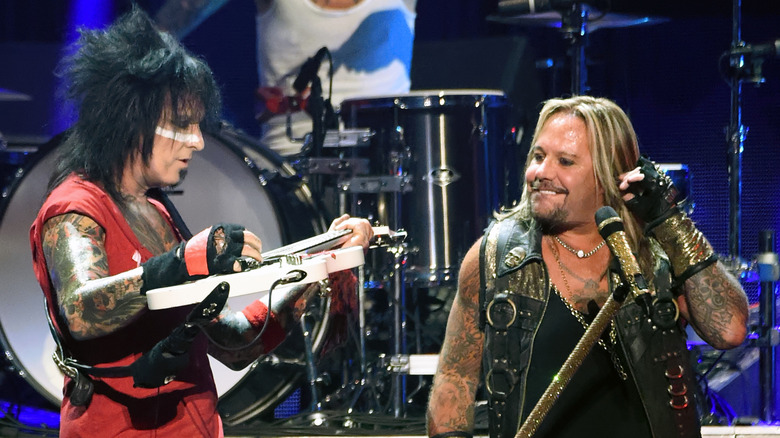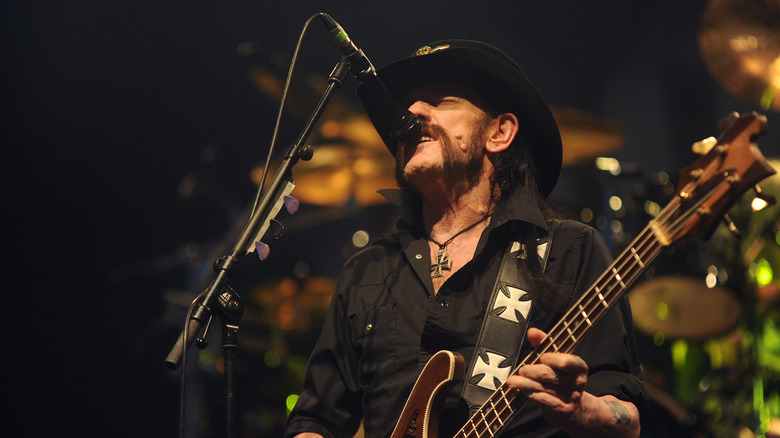Worst Farewell Tours From '80s Bands
Aspiring rock musicians of every generation have dreamed of being in a successful band: touring the world, making millions, and basking in the adulation of millions of fans. But the fact is that life in a band isn't always easy. Aside from being a hedonistic romp across the globe, touring can be pretty gruelling, with even seasoned veterans of the road finding themselves struggling to spend 24 hours a day around the same people they perform with night after night.
It's no surprise that, for one reason or another, musical acts decide at some point that it might be worth calling it a day. For some, it is obvious that the band is no longer pulling in the same direction, while for others, medical or personal issues can force a band to say farewell to their fanbase. In some of the cases listed below, the acts in question have no idea that the tour in question is a farewell at all; instead, it only becomes clear in hindsight. Here are some of the farewell tours from artists who were big in the 1980s, which — whether due to internal strife, backtracking on the farewell itself, or, heartbreakingly, the ill-health if its performers — proved not to be the feel-good send off that the fans hoped they would be.
Ozzy Osbourne – No More Tours I (1992)
The former Black Sabbath frontman went on to have a successful solo career following his firing from Sabbath in 1979, after which he toured frequently with his own band of musicians, known as the Blizzard of Ozz. By the 1990s, the former hellraiser had overcome his addiction issues and was enjoying a period of sobriety that made him reconsider his rock 'n' roll lifestyle. Ozzy, who was only in his early 40s, had been misdiagnosed with multiple sclerosis and said that he was retiring to spend more time with his family.
Entitled the "No More Tours" tour, Ozzy said goodbye to his fans over the course of 64 dates, but while the legendary frontman had lost little of his charm, the shows in general were somewhat underwhelming, with fans complaining that the setlist drew too strongly on the previous year's "No More Tears" studio album, instead of classics from a decade earlier. There was also some controversy during the last two dates of the tour when Ronnie James Dio, who was supporting Ozzy as the new lead singer of Black Sabbath on the tour (Sabbath was the support act), refused to go on stage, and was replaced by Judas Priest's Rob Halford.
But more controversial than that was Ozzy's almost immediate U-turn on his retirement, with the singer announcing that he would be returning to a full-time music career just three years later with the "Retirement Sucks" tour. That he undermined his farewell would undoubtedly have been a point of frustration for fans who took a financial hit to make it to one of the shows on what was billed as his final ever tour. However, that may all be forgotten now, with Ozzy's actual final concert in 2025 hailed as a huge success.
The Police – Synchronicity (1983)
By the early 1980s, the British band the Police had emerged as one of the biggest musical acts in the world, with a slew of chart-busting singles and classic albums that expertly blended the pop, rock, punk, reggae, and jazz influences of its three members. Despite emerging during the punk explosion of the 1970s, the Police were a polished, professional outfit, and its members — principal songwriter, bassist, and vocalist Sting, guitarist and songwriter Andy Summers, and drummer Stewart Copeland — proved miraculous as a three-piece live act capable of generating a mesmerizing wall of sound.
The 1983 album "Syncronicity" was where the band hit its commercial peak, with the record hitting No. 1 in both the U.S. and the U.K., and a few of its singles, including "Every Breath You Take," become radio classics. The Police supported the album with an enormous world tour, the largest concert of which, at Shea Stadium, saw them perform their flawless set in front of a sold-out crowd of 70,000 fans. At that moment, the Police were the biggest band in the world, and looked set to dominate pop for the rest of the decade.
But little did fans know that, during that exact concert, Sting had decided that this would be the Police's farewell tour. Recognizing that their commercial peak could not be topped, and amid continued animosity between the band's members both in the studio and onstage, Sting privately made the decision that the Police would come to an end after the tour, per the BBC. However, with more than 100 dates still to go, the tension between the band members was intense, and while the band pumped out the hits night after night to thousands of fans, "Synchronicity" has gone down in music legend as one of the most bad-tempered farewell tours of all time.
Motley Crüe – The Final Tour (2014-15)
There are few bands in the history of rock music as famously ramshackle as Motley Crüe, the party-loving '80s hair-metal band whose hedonism at the height of its fame was legendary. While partying with Motley Crüe may have been the dream of many rock fans of the era, the truth was that the band's members were struggling with addiction, leading to their eventual fracturing in the decades that followed. By the mid-2010s, the band was already anticipating the end, and planned an enormous farewell tour to give its fans one last shot of hair-metal fun before Vince Neil, Nikki Sixx, Mick Mars, and Tommy Lee disappeared into the sunset.
Fans ate up the opportunity to catch Motley Crüe one last time, and excitement built when news spread that the legendary Alice Cooper was to be the opening act for "The Final Tour." The opening show came on July 2, 2014, in Grand Rapids, Michigan, and after the evergreen Cooper treated the crowd to a typically professional and theatrical performance, the stage was set for the Crüe to show the world they still had it. Unfortunately, that didn't happen.
Instead, the show was a disaster, with Mars forgetting the guitar parts, Lee's drum kit malfunctioning, and several extended pauses that killed the momentum and elicited boos from the crowd. Though reviews from later stops on the tour were more positive — the band undoubtedly worked to get its stage show in order – the first show cast a long shadow over the farewell tour, which, in any case, proved not to be a farewell tour at all, as Motley Crüe continues to play shows today.
Motörhead – Lemmy's last tour (2015)
When rock stars — who are often thought of as gods by their fans — suffer ill health, it can be utterly heartbreaking, and in 2015, metalheads had to deal with the upsetting sight of Lemmy, the ferocious frontman of the legendary band Motörhead, losing his health right in front of their eyes. The band was celebrating 40 years of its existence and the release of its new album "XXX: Bad Magic" with an enormous tour, with further dates due to be added after a set of European dates at the start of the year.
But the fact was that despite his prolific output in terms of gigs and recordings, Lemmy had been struggling for some time, with a canceled show in 2013 foreshadowing several cancellations two years later and instances in which Lemmy had to leave the stage, apologizing to audiences that he was unable to continue. Around this time, he underwent surgery to install a defibrillator.
Nevertheless, he continued to rock as best he could. The final show of the first leg of the tour took place in Berlin, Germany, on December 11, and turned out to be the last time Lemmy would take to the stage. The rocker remained defiant, howling out his vocals with all he had. On December 26, he was diagnosed with cancer and died two days later, having been dedicated to his band until the very end.
